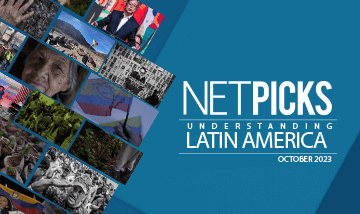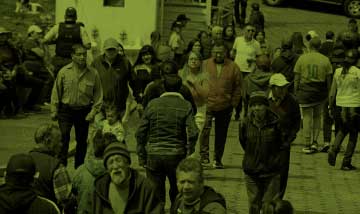Índice
- HONDURAN
- HONDURAN PRESIDENT, A TRUMP ALLY IMPLICATED IN DRUG TRAFFICKING, TRIES TO WIN OVER BIDEN
- BRAZIL
- MEXICO WAS ONCE A CLIMATE LEADER – NOW IT’S BETTING BIG ON COAL
- CHILE: WHERE WATER IS A TRADED COMMODITY
- RELIGIOUS CONSERVATISM IS SHAPING THE CIVIL LIBERTIES DEBATE IN CUBA
- ECUADORIAN ELECTIONS
- TWO DIFFERENT VISIONS OF THE LEFT DIVIDE ECUADOR IN THE 2021 PRESIDENTIAL ELECTION
Understanding Latin America
Dear readers and colleagues, this month we bring you six articles that reflect the reality of Latin America: one from Honduras, Mexico, Chile and Cuba, and two from Ecuador on the aftermath of the recent first round of presidential elections.
- Honduran president, a trump ally implicated in drug trafficking, tries to win over Biden
- Mexico was once a climate leader – now it’s betting big on coal
- Chile: where water is a traded commodity
- Religious conservatism is shaping the civil liberties debate in Cuba
- Ecuador’s pro-mining politics dealt a blow by Indigenous, green movement
- Two different visions of the left divide Ecuador in the 2021 presidential election
HONDURAN
HONDURAN PRESIDENT, A TRUMP ALLY IMPLICATED IN DRUG TRAFFICKING, TRIES TO WIN OVER BIDEN
When Juan Orlando Hernández was reelected in 2017 in the midst of claims of fraud, former US president Donald Trump backed him despite the allegations. The evidence against the Honduran President contained in multiple indictments, including one against his brother, Tony, a former Honduras congressman convicted of cocaine trafficking in 2019, was also glossed over. In that particular case, the US Justice Department claimed that in 2013 Tony Hernández had delivered a $1 million bribe from “El Chapo” Guzmán of the Sinaloa cartel to Juan Orlando; US prosecutors have also stated that Hernandez agreed “to facilitate the use of Honduran armed forces personnel as security” for drug traffickers. During the Trump administration, the major US concern was migration, and as a consequence irregularities in the inner workings of the country and its President tended to be glossed over. The relationship between the Honduran President and his US counterpart worked well for Hernández, who from all accounts knew well what Trump was interested in, and how to hand it over in return for non-interference. Drug control was increased, the police purged, and an extradition treaty signed. For his part Tru,pdid not interfere when Honduras suppressed an anti-corruption agency in 2020, and was well pleased with a deal to send non Honduran migrants to that country as part of the ‘Safe Third Country’ agreements he promoted. But with the election of Joe Biden things are changing. And despite Hernandez’ expressed desire to work with Biden and his team, some wonder whether the Honduran President really understands the depth of the changes the new regime will bring, and whether he will be able to survive the next round. Hernandez, for his part, seems interested in trying.
Kevin Sieff, February 12th, 2021
BRAZIL
MEXICO WAS ONCE A CLIMATE LEADER – NOW IT’S BETTING BIG ON COAL
Until recently Mexico was a believer in renewable energy, being the first developing country to deliver its climate action plan ahead of the Paris Climate Change agreement. But while President Lopez Obrador (AMLO) has said his government will refurbish the hydroelectric installations of the state energy company (CFE), allowing Mexico to meet its climate commitments of 35% of electricity generated by renewables, the emphasis now appears to be on support for national industries such as coal mining. In fact, the CFE’s current investment plan does not even include renewable energy projects, and proposed legislation to overhaul the electricity industry would also give priority to purchasing power from the CFE’s own facilities, including coal plants, over energy from privately owned renewables. Coal produces roughly 9.5% of Mexico’s electricity, and in the coalmining region of Coahuila, mining almost ground to a halt in 2019 and ten thousand miners lost their jobs, when the CFE stopped purchasing as part of a plan to move to cleaner energy sources. It was precisely in Coahuila that AMLO announced the reactivation of the CFE’s coal-fired plants, referring to clean energy as a ‘sophism’ used by his predecessors to open up the energy sector to private and foreign investors, and consequently weaken state enterprises.
David Agren, February 15th, 2021.
.
CHILE: WHERE WATER IS A TRADED COMMODITY
The lack of institutional strength in most Latin American countries could lead to a strengthened military presence after the Covid 19 is over, according to analysts. While the role of the military in organizing and distributing assistance in the Covid-19 pandemic would have been difficult to replicate by other means, historic institutional weakness may lead to their role being consolidated and expanded in coming years. The danger is that as well as a supporting role, the military may also be encouraged to suppress opposition and protest, as has taken place during the lockdowns in a number of countries of the region. In Peru, for example, more than 18,000 people were detained during the first weeks of lockdown. An enlarged presence does not imply another round of Coup de D’états, rather that an expanded military role will imply a greater share of national budgets as well as an increase in influence over, and ability to question civilian governments. In a scenario in which democratically elected administrations and democracy itself are increasingly questioned, the military will almost certainly be inclined assume greater protagonism in the face of what they consider to be ‘incompetent’ regimes. The civilian protest movements that have also increased in strength in a number of countries may, however, provide some level of counterbalance.
Kinga Harasim, February 11th, 2021
https://lab.org.uk/chile-where-water-is-a-traded-commodity/
.
RELIGIOUS CONSERVATISM IS SHAPING THE CIVIL LIBERTIES DEBATE IN CUBA
The debates that led to the approval of Cuba’s new Constitution in February 2019, were notable, amongst other things, for the organizing capacity shown by conservative religious institutions, both catholic and, particularly, evangelical. It was the discussion over the proposed legalization of same sex marriage that most clearly revealed the presence of a grassroots religious conservative movement with a surprising level of influence. The Catholic Church even took the unprecedented step of launching a public campaign asking the faithful to vote against legalizing same sex marriage. Now, as the country prepares to discuss equal marriage as part of a new family code, conflicting views of social justice and a struggle over civil liberties are at the center of the debate. The Catholic Church has always been important in Cuba, but it was the emergence of the evangelical churches, beginning in the 1990s, that spurred the growth of the conservative ideas and groups that have now spread to different sectors of the Island’s population. According to the author, the opposition of these churches to same sex marriage and abortion (freely available on the island since 1965) are ironically seen by some as ‘revolutionary’, in the sense that they are presented as alternatives to Marxist dogma. And In the latter case, the Island’s falling birth rate has even lent the opposition a political edge. Whatever the outcome of the pressure being applied religious conservatives this time around, says the author, the Evangelical and Catholic Churches will continue to wield a level of influence previously only permitted to Government sponsored civil society organizations. The churches’ presence will undoubtedly reshape the nature of political debate in Cuba.
Bryan Ch. Campbell Romero, February 4th, 2021
https://nacla.org/news/2021/02/03/religious-conservatism-cuba
.
ECUADORIAN ELECTIONS
The recent first round of voting on Ecuador’s presidential elections left only two things certain: the victory of the anti-mining plebiscite in the city of Cuenca, discussed in the first of the two articles, and the victory Andres Arauz, representing a continuation of Rafael Correa’s previous government, who will therefore participate in the second round on April 11th. Everything else is mired in controversy. The proposed recount in large parts of the country agreed to by Yaku Perez and Guillermo Lasso who are disputing second place and the right to challenge Arauz, never took place, although a very small number of ballots were revised and found to have numerous discrepancies. The inconsistencies principally although not solely favored Perez, who has called on indigenous people to protest what he says is fraud, and demand a much wider recount. The protests are under way and the Electoral Judicial Tribunal is presently considering his demand. The sub text is a battle within the indigenous movement itself. Perez’ party Pachakutik and the indigenous movement of the central highlands, Ecuarunari, are challenging the leaders of the national organization CONAIE, who were responsible for the major anti neoliberal protests of October 2020. The title of left candidate is also in dispute, Arauz and Perez supporters accusing each other of being on the right. We will keep you informed.
ECUADOR’S PRO-MINING POLITICS DEALT A BLOW BY INDIGENOUS, GREEN MOVEMENT
Miriam Lang, February 15th, 2021
https://www.opendemocracy.net/en/democraciaabierta/ecuador-pro-mining-politics-indigenous-green-movement-victory/
.
TWO DIFFERENT VISIONS OF THE LEFT DIVIDE ECUADOR IN THE 2021 PRESIDENTIAL ELECTION
Roberta Rice. February 13th, 2021
INVITATION
We would also like to invite you to participate in the webinar Rosa Luxemburg in Latin America,
celebrating the 150th anniversary of the birth of Rosa Luxemburg, and the enormous influence she and her ideas have had on Latin America.
17:00 Rosa Luxemburg in Latin America
Chair: Pablo Slavin
- Rosa Rosa Gomes, “An analysis of the Brazilian Left from Luxemburg’s point of view”
- Marina Kabat, “Rosa Luxemburg, the mass strike debate, and its implications for understanding contemporary labor unrest and political dynamics in Latin America”
- Juliana Tumini, “The role of the right to the city as an instrument of revolution in Latin America: A view from Rosa Luxemburg’s perspective”
- Tomás Várnagy, “Rosa Luxemburg, a Central European revolutionary”
We also invite you to take a look at the Foundations new website in English: https://rosaluxemburg.org/en/positions/





